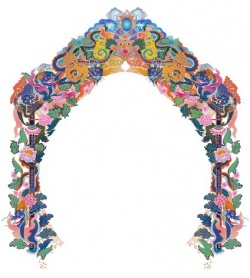Difference between revisions of "Buddha's Legacy Teachings Sutra"
m (Text replacement - "Category:Japanese terminology" to "{{JapaneseTerminology}}") |
|||
| Line 3: | Line 3: | ||
[[Buddha's Legacy Teachings Sutra]] | [[Buddha's Legacy Teachings Sutra]] | ||
[[仏遺教経]] ( Jpn[[ Butsu-yuikyo-gyo]] ) | [[仏遺教経]] ( Jpn[[ Butsu-yuikyo-gyo]] ) | ||
| + | |||
| + | |||
| + | [[Legacy Teachings Sutra]] | ||
| + | [[遺教経]] ([[Chin]] [[I-chiao-ching]]; Jpn [[Yuikyo-gyo]] ) | ||
| + | |||
| + | Also known as the [[Buddha's Legacy Teachings Sutra]]. A [[sutra]] translated into {{Wiki|Chinese}} by [[Kumarajiva]] in the early fifth century. It purports to have been [[preached]] by [[Shakyamuni Buddha]] as his final instruction to his [[disciples]] under the {{Wiki|sal trees}} just before his [[death]]. This [[sutra]] says that, after the [[Buddha's]] [[death]], one should observe the [[precepts]] in order to control the [[five sense organs]] and regulate the [[mind]], and devote oneself to [[Buddhist practice]] without succumbing to [[laziness]] and [[sloth]]. Though an extremely short [[sutra]], [[Kumarajiva's]] translation of it is regarded as one of the best among {{Wiki|Chinese}} [[sutra]] translations because of its polished style and {{Wiki|excellent}} wording. The [[Legacy Teachings Sutra]] was widely favored and read by many [[people]], and a number of commentaries on it were produced. The [[Zen school]], in particular, values this [[sutra]]. | ||
| + | |||
See; [[Legacy Teachings Sutra]]. | See; [[Legacy Teachings Sutra]]. | ||
Latest revision as of 12:10, 21 September 2015
Buddha's Legacy Teachings Sutra
仏遺教経 ( JpnButsu-yuikyo-gyo )
Legacy Teachings Sutra
遺教経 (Chin I-chiao-ching; Jpn Yuikyo-gyo )
Also known as the Buddha's Legacy Teachings Sutra. A sutra translated into Chinese by Kumarajiva in the early fifth century. It purports to have been preached by Shakyamuni Buddha as his final instruction to his disciples under the sal trees just before his death. This sutra says that, after the Buddha's death, one should observe the precepts in order to control the five sense organs and regulate the mind, and devote oneself to Buddhist practice without succumbing to laziness and sloth. Though an extremely short sutra, Kumarajiva's translation of it is regarded as one of the best among Chinese sutra translations because of its polished style and excellent wording. The Legacy Teachings Sutra was widely favored and read by many people, and a number of commentaries on it were produced. The Zen school, in particular, values this sutra.
See; Legacy Teachings Sutra.
